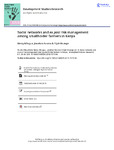| dc.description.abstract | Smallholder farmers in developing countries are vulnerable to idiosyncratic and covariate risks. The risks affect their welfare through the shocks they impose on income, assets, health and food supply.To cope with these shocks, smallholder farmers have extensively relied on informal risk management strategies such as social networks, due to the poorly developed or missing formal insurance markets. Social networks play a risk-sharing role through transfers (loans and gifts)within the networks. This paper evaluates the factors influencing the formation of financial and non-financial networks as informal insurance strategies, using cross-sectional data collected from815 households in Kenya and analysed using a dyadic linear probability model. Results show that kinship, geographical proximity, education and age are important determinants of both financial and non-financial links. Health shock is also correlated with the formation of financial links. The findings suggest that financial links play a risk-sharing role when farmers are faced with health shocks. The paper concludes that financial networks act as insurance against idiosyncratic health shocks. | en_US |

